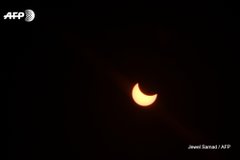Solar Eclipse 2020 LIVE updates in Pakistan

11:23am - Temperature drops in cities in Sindh
Sukkur, Larkana and Hyderabad saw a drop in temperatures as they witnessed a solar eclipse.
The 'ring of fire' appeared in Sukkur at 11:08 for a few seconds on Sunday. Sukkur is one of the few cities in Pakistan where the 'ring of fire' appeared.
11:08am - ‘Ring of fire’ witnessed in Sukkur
The 'ring of fire' appeared in Sukkur at 11:08 for a few seconds on Sunday. Sukkur is one of the few cities in Pakistan where the 'ring of fire' appeared.
11:05am – Solar eclipse reaches its peak Karachi
The solar eclipse has reached its peak in Karachi. According to experts, Karachi will not witness a ‘ring of fire’ like other cities in the country.
The ‘ring of fire’ will be witnesses in Sukkur, Gwadar and Larkana.
11:00am - Namaz-e-Kasoof offered across Pakistan
Namaz-e-Kasoof is being offered across the country as Pakistan witnesses the ‘ring of fire’ solar eclipse.
In Islam, Namaz-e-Kasoof or eclipse prayer is offered when solar or lunar eclipses occur. It is typically performed in groups, in mosques led by an imam.
10:35am - Solar eclipse does not affect health: experts
Experts suggest that solar eclipse does not affect a person’s health or mood as it has come to be believed. However, specialists have warned against watching the solar eclipse directly as it may harm the eyes.
10:20am - 10% of the sun eclipsed in Karachi
According to director Science and Technology, Professor Javed Iqbal 10% of the sun has been eclipsed in Karachi. The solar eclipse will reach its peak at 11:40am in Karachi and end at 12:46am.
9:50am - Solar eclipse begins in Lahore
Solar eclipse is being observed in Lahore right now. The solar eclipse will reach its peak at 11:26am and end at 1:10pm in Lahore, according to the MET office.
9:45am - Solar eclipse to reach its peak at 11:40am in Karachi
Like other cities in Pakistan, Karachi is also witnessing the ‘ring of fire’. According to the MET office, the solar eclipse will reach its peak at 11:40am in Karachi and end at 12:46am.
9:40am - ISST makes special arrangements to view solar eclipse
The Institute of Space Science and Technology (ISST) University of Karachi has made arrangement to observe the annular solar eclipse at the ISST’s Astronomical Observatory today.
9:35am - Solar eclipse begins in Sukkur, Gwadar, Quetta
The ‘ring of fire’ is being witnessed in Pakistani cities of Sukkur, Gwadar and Quetta along with other cities across the world today.
Experts says the solar eclipse will be witnessed 99% in Sukkur and Gwadar and most cities in Balochistan.
9:30am - 'Ring of Fire' to remain visible from 09:26am to 1:00pm in Pakistan
The ‘ring of fire’ will remain visible across Pakistan from 09:26am to 1:00pm. Experts have warned against looking directly as it can permanently damage the eyes.
During a solar eclipse, the sun rays become so powerful that they can permanently damage the retina. These powerful UV solar radiations can surprise you and penetrate your eyes before you have a chance to look away.
9:25am - Republic of Congo to be first to witness ‘ring of fire’
The "ring of fire" will first be seen in northeastern Republic of Congo at 5:56 local time (04:56 GMT) just a few minutes after sunrise.
This is the point of maximum duration, with the blackout lasting 1 minute and 22 seconds.
Arcing eastward across Asia and Africa, it will reach "maximum eclipse" — with a perfect solar halo around the Moon — over Uttarakhand, India near the Sino-Indian border at 12:10 local time (6:40 GMT).
More spectacular, but less long-lived: the exact alignment of the Earth, Moon and Sun will be visible for only 38 seconds.
9:15am - 'Ring of fire'solar eclipse to dim Africa, Asia
Skywatchers along a narrow band from west Africa to the Arabian Peninsula, India and southern China will witness a dramatic "ring of fire" solar eclipse.
So-called annular eclipses occur when the Moon — passing between Earth and the Sun — is not quite close enough to our planet to completely obscure sunlight, leaving a thin ring of the solar disc visible.
06:00am - Don't watch it with naked eyes
It's strongly advised that no one should watch the Solar Eclipse 2020 with naked eyes. It can permanently damage the eyes. When the Moon comes in between the Earth and the Sun, the sun rays become so powerful that they can permanently damage retina (most important part of the eye). These powerful UV solar radiation can surprise you and penetrate your eyes before you have a chance to look away.
Is it alright to watch the solar eclipse with bare eyes as only a little part of the sun is visible?
NASA says even if the 99 percent of the sun's surface is covered during the partial phases of a solar eclipse, the small visible part can still burn the retina.
Is it advisable to view the solar eclipse through dark lenses or film?
No. It's not safe. If you watch the solar eclipse while wearing dark lenses or film, it still can lead to permanent vision loss.
Are there safe ways to observe the solar eclipse?
Yes, there're. Wear your protective eyeglasses, binoculars, use a telescope or a box projector to safely witness the solar eclipse. You can also buy solar filters or eclipse glasses. Make sure to buy these only from a reliable source and they are approved by NASA or ISRO.
If you want to capture the images of the eclipse, you can use your smartphone or a DSLR camera for the purpose.
No comments:
Post a Comment